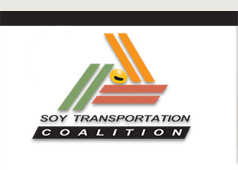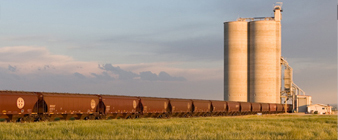 |
 |
|
| eNews • July 2011 | ||
| Promoting a Cost-Effective, Reliable and Competitive Transportation System |
||
 Soy Transportation Coalition, Indiana Soybean Alliance Host STB Commissioner on Ag Loading Tour
Soy Transportation Coalition, Indiana Soybean Alliance Host STB Commissioner on Ag Loading Tour
The Soy Transportation Coalition and the Indiana Soybean Alliance hosted Surface Transportation Board (STB) Commissioner Francis Mulvey in Indiana on June 16 to tour the Louis Dreyfus soybean processing plant in Claypool and the Central States Enterprises elevator in New Haven. Following the tours, the Soy Transportation Coalition hosted a luncheon attended by a group of Indiana agricultural shippers and farmers – providing an opportunity for Commissioner Mulvey to hear first hand comments and concerns regarding the quality and reliability of rail service.
The Surface Transportation Board is a semi-autonomous federal agency charged with resolving railroad rate and service disputes and reviewing proposed railroad mergers and acquisitions. The organization is governed by a three person board, consisting of a chairman and two commissioners. The chairman and commissioners are appointed by the president and confirmed by the Senate for a five year term of office.
“The Soy Transportation Coalition was pleased to co-host Commissioner Mulvey for a tour of ag loading facilities,” explains Mike Steenhoek, executive director of the Soy Transportation Coalition. “Our nation’s railroads are critical to the profitability of the soybean industry. In a tight margin business like agriculture, the unreliability of rail service or escalating rail rates can often make the difference between profit and loss. It is therefore important for members of the Surface Transportation Board to possess an acute understanding of agriculture’s unique concerns. We appreciate Commissioner Mulvey’s willingness to meet with and learn from those who ship those products that farmers grow.”
During the visit, various ag shippers expressed concerns about service reliability and poor communication from the railroads. In particular, there was sizable frustration with the rail industry’s inability to accurately anticipate the increased rail traffic in 2010 and 2011 after the economic downturn in 2008 and 2009. During the recession, most railroads, in an effort to reduce costs, furloughed a number of employees and equipment. However, as freight traffic rebounded in 2010, a number of railroads were caught off guard and failed to augment their service capacity. As a result, service reliability diminished. A number of grain elevators and processors were unable to fulfill customer demands as promised due to unpredictable or significantly delayed rail service.
Mulvey, first appointed to the STB in 2004 and reappointed in 2007, encouraged agricultural shippers frustrated by poor rail service to avail themselves of the STB’s Rail Customer and Public Assistance Program – designed as an avenue for shippers to have grievances addressed without the need to file a formal claim against a railroad. Commissioner Mulvey also provided an update on the STB’s upcoming hearing on June 22-23 to examine whether there is sufficient competition in the rail industry. Mulvey stated the STB is trying to take a number of steps to become more accessible and transparent for both railroads and rail customers.
“Agriculture is an important component of our overall economy,” according to Commissioner Mulvey. “It is therefore essential for the STB to encourage a mutually beneficial relationship between railroads and agricultural shippers. I enjoyed the opportunity to get out of Washington, DC, and visit with those in agriculture who are directly impacted by the performance of our nation’s railroads. I appreciate the Soy Transportation Coalition and the Indiana Soybean Alliance for hosting me on this worthwhile visit.”
According to the Soy Transportation Coalition, the seven Class I railroads operating in the United States annually transport more than 24 million tons of soybeans, 17 million tons of soybean meal, and 6 million tons of soybean oil. Class I railroads have an annual operating revenue exceeding $378 million.
Soy Transportation Coalition |
|
